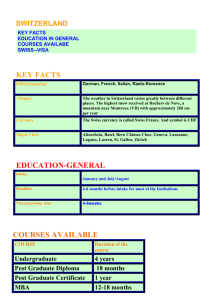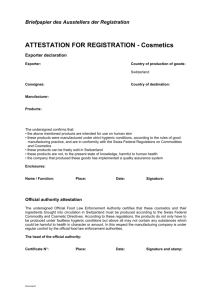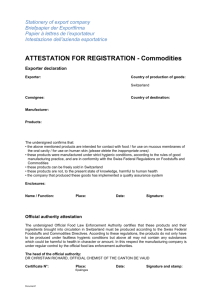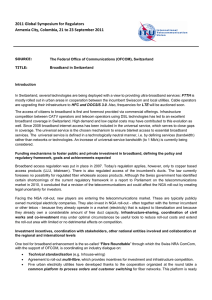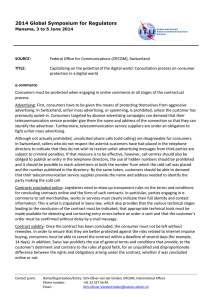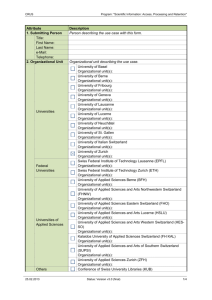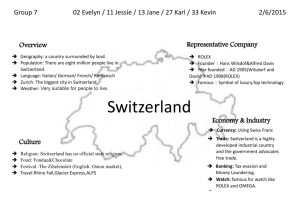ITU 2012 Global Symposium for Regulators (GSR) Consultation - Fostering... – Contribution from OFCOM, Switzerland
advertisement
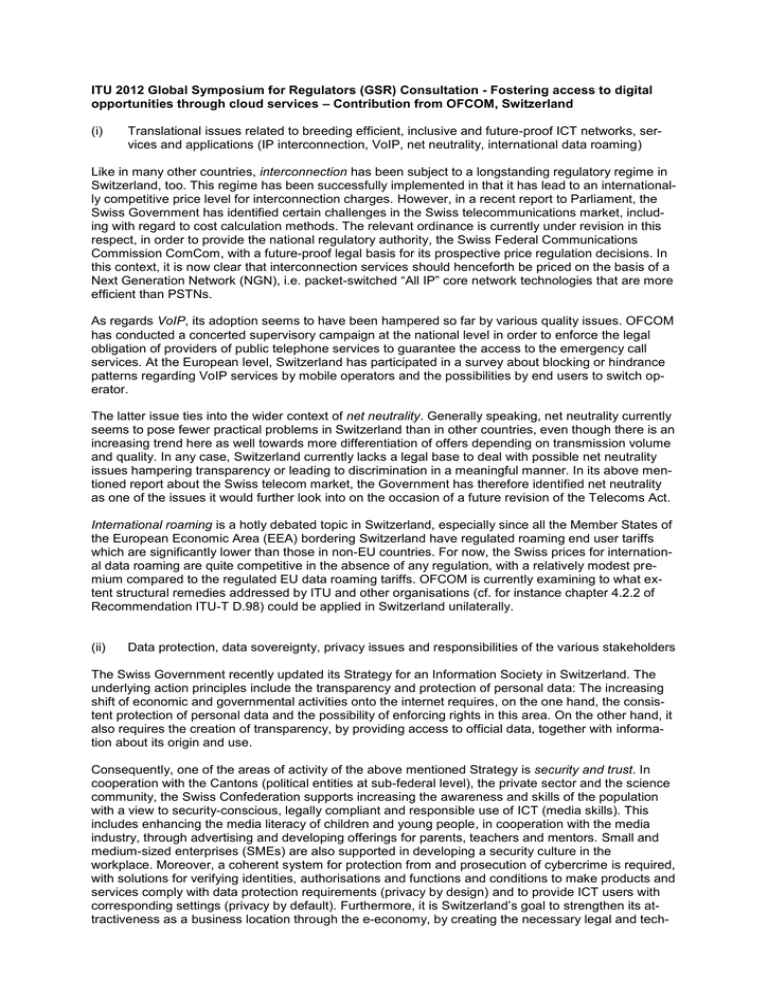
ITU 2012 Global Symposium for Regulators (GSR) Consultation - Fostering access to digital opportunities through cloud services – Contribution from OFCOM, Switzerland (i) Translational issues related to breeding efficient, inclusive and future-proof ICT networks, services and applications (IP interconnection, VoIP, net neutrality, international data roaming) Like in many other countries, interconnection has been subject to a longstanding regulatory regime in Switzerland, too. This regime has been successfully implemented in that it has lead to an internationally competitive price level for interconnection charges. However, in a recent report to Parliament, the Swiss Government has identified certain challenges in the Swiss telecommunications market, including with regard to cost calculation methods. The relevant ordinance is currently under revision in this respect, in order to provide the national regulatory authority, the Swiss Federal Communications Commission ComCom, with a future-proof legal basis for its prospective price regulation decisions. In this context, it is now clear that interconnection services should henceforth be priced on the basis of a Next Generation Network (NGN), i.e. packet-switched “All IP” core network technologies that are more efficient than PSTNs. As regards VoIP, its adoption seems to have been hampered so far by various quality issues. OFCOM has conducted a concerted supervisory campaign at the national level in order to enforce the legal obligation of providers of public telephone services to guarantee the access to the emergency call services. At the European level, Switzerland has participated in a survey about blocking or hindrance patterns regarding VoIP services by mobile operators and the possibilities by end users to switch operator. The latter issue ties into the wider context of net neutrality. Generally speaking, net neutrality currently seems to pose fewer practical problems in Switzerland than in other countries, even though there is an increasing trend here as well towards more differentiation of offers depending on transmission volume and quality. In any case, Switzerland currently lacks a legal base to deal with possible net neutrality issues hampering transparency or leading to discrimination in a meaningful manner. In its above mentioned report about the Swiss telecom market, the Government has therefore identified net neutrality as one of the issues it would further look into on the occasion of a future revision of the Telecoms Act. International roaming is a hotly debated topic in Switzerland, especially since all the Member States of the European Economic Area (EEA) bordering Switzerland have regulated roaming end user tariffs which are significantly lower than those in non-EU countries. For now, the Swiss prices for international data roaming are quite competitive in the absence of any regulation, with a relatively modest premium compared to the regulated EU data roaming tariffs. OFCOM is currently examining to what extent structural remedies addressed by ITU and other organisations (cf. for instance chapter 4.2.2 of Recommendation ITU-T D.98) could be applied in Switzerland unilaterally. (ii) Data protection, data sovereignty, privacy issues and responsibilities of the various stakeholders The Swiss Government recently updated its Strategy for an Information Society in Switzerland. The underlying action principles include the transparency and protection of personal data: The increasing shift of economic and governmental activities onto the internet requires, on the one hand, the consistent protection of personal data and the possibility of enforcing rights in this area. On the other hand, it also requires the creation of transparency, by providing access to official data, together with information about its origin and use. Consequently, one of the areas of activity of the above mentioned Strategy is security and trust. In cooperation with the Cantons (political entities at sub-federal level), the private sector and the science community, the Swiss Confederation supports increasing the awareness and skills of the population with a view to security-conscious, legally compliant and responsible use of ICT (media skills). This includes enhancing the media literacy of children and young people, in cooperation with the media industry, through advertising and developing offerings for parents, teachers and mentors. Small and medium-sized enterprises (SMEs) are also supported in developing a security culture in the workplace. Moreover, a coherent system for protection from and prosecution of cybercrime is required, with solutions for verifying identities, authorisations and functions and conditions to make products and services comply with data protection requirements (privacy by design) and to provide ICT users with corresponding settings (privacy by default). Furthermore, it is Switzerland’s goal to strengthen its attractiveness as a business location through the e-economy, by creating the necessary legal and tech- nical conditions to occupy a leading international position as a business location in terms of its data security. To that end, a multi stakeholder group has been set up that brings together representatives from government, academia and the private sector. It aims at identifying business and research opportunities in connection with data security and the actions by the different stakeholders necessary to unleash its economic potential. (iii) Public-Private Partnership (PPP): strategies for expanding cloud services Investment incentives, coordination with stakeholders, other national entities involved and collaboration at the regional and international levels Powerful next generation networks (NGN) as well as next-generation access (NGA) are a condition precedent for making full use of cloud services. Facing the NGA roll-out, new players are entering the telecommunications market. These are typically publicly owned municipal electricity companies. They also invest in fiber roll-out - often together with the former incumbent - because they already operate in a market (electricity) that is subject to liberalisation and because they already own a considerable amount of free duct capacity. Infrastructure-sharing, coordination of civil works and co-investment may under optimal circumstances be useful tools to reduce roll-out costs and extend the roll-out area with limited or no detrimental effects on competition. In order to foster fibre access and thus maintain infrastructure competition with new generation cable networks (DOCSIS 3.0), the Swiss NRA set up a Fibre Round Table in 2008, an industry dialogue at CEO level which, by early 2012, had achieved significant results: technical standardisation (e.g. inhouse-wiring); agreement to roll-out multi-fibre which provides incentives for investment and infrastructure competition; five urban electricity utilities developing a common platform to process orders and customer switching for fiber networks; agreement on economically efficient roll-out by using empty ducts of the utilities and avoiding parallel networks via coordination, agreement that home owners should be consulted. Moreover, OFCOM launched a multi-stakeholder process in summer 2011, convening a so-called “Next Generation Access” Working Group. It is composed by representatives of federal and subfederal authorities, telcos, utility companies as well as associations of cities, municipalities and peripheral regions. The aim of this group is threefold: to produce an NGA infrastructure mapping of Switzerland, to assess demand for NGA services and to provide guidance to the roll-out of NGA networks in peripheral areas. Expanding digital literacy Digital literacy is promoted by the national e-Inclusion network (www.einclusion.ch). The network supports projects oriented towards special target groups (e.g. the elderly) as defined in the national action plan on digital inclusion.
